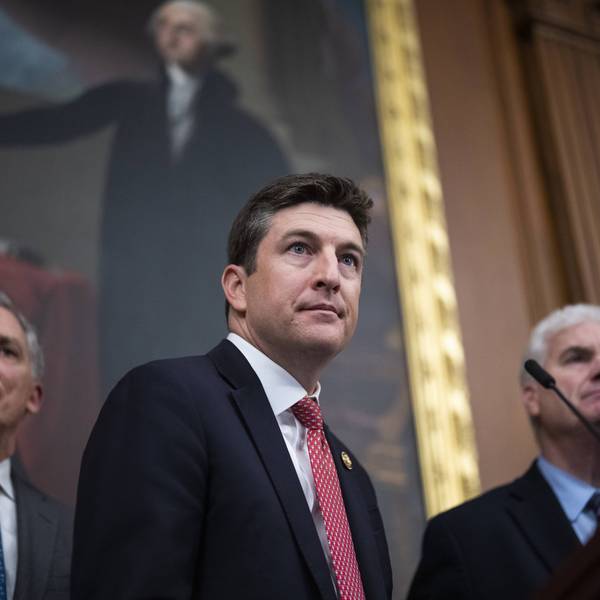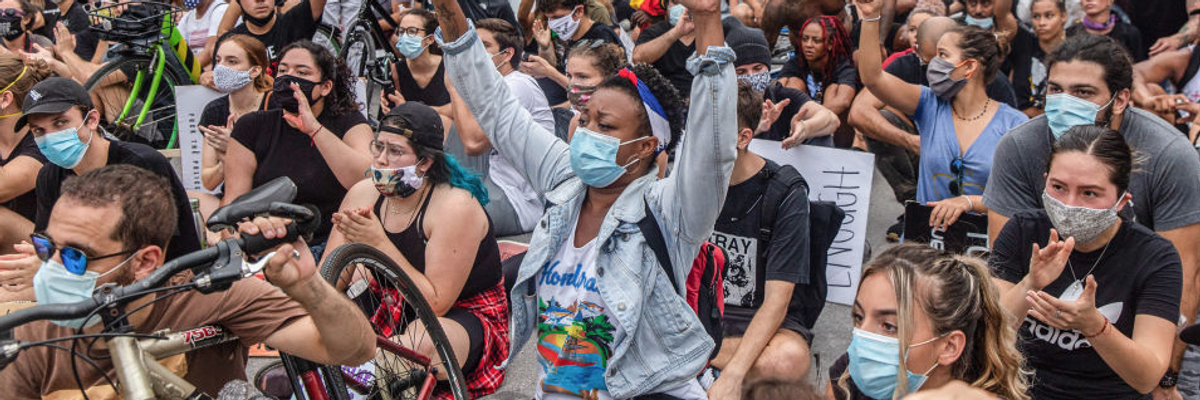How did a growing and necessary conversation about race in America--a conversation that a majority of Americans in 2020 said they wanted to have--become hijacked by an attack on a field of study called critical race theory? You can trace the strategy back to the right-wing think tank, the Heritage Foundation and far right operative, Chris Rufo.
Mere weeks after George Floyd's brutal murder and the subsequent public outcry, Rufo launched his attack against racial justice. The Trump administration then adopted Chris Rufo's approach in an effort to shut down an emerging national conversation on race by issuing an executive order calling on agencies to end trainings banning words like systemic racism in subsequent documents explaining the order. The rising extremist voices and threats against multiracial democracy had found their approach.
What is Chris Rufo's argument? According to Dominique Apollo of Race Forward, in 2020--the same year that the term systemic racism had more mentions in mainstream media during the month of June alone than in the previous 30 years combined - Rufo insisted that systemic racism does not exist. In short, the argument seeks to blind us to the systemic racism that shapes almost every life outcome in our country by reducing our understanding of racism to individual bias and bigotry, thus creating a narrative of victimhood for white people. Rufo argues that it is harmful to speak the truth about systemic racism.
Plain and simple, it's a divide and conquer tactic used by elites to pit us against each other. Trump's executive order barely saw the light of day before it was thrown into court, and then was rescinded by President Biden, who replaced it with an order mandating the federal government to ensure racially equitable processes and outcomes in its work. But versions of this perverse argument have now passed as legislation in three states and still others are being advanced in 20 more. In addition, the argument is cropping up as a central debate in school districts across the country.
Below I attempt to outline what I see as the three key elements of this war on democracy, how we can thwart these efforts to keep us divided, and strategies to unite our communities.
-
They seek to halt the progress of addressing systemic racism while waging an attack on our most valuable public institutions from education to local government to foundations.
The brutal murder of George Floyd last May captured on video ignited one of the largest protest movements in our country's history, and accelerating the long overdue process to address systemic racism. The Black Lives Matter movement, which grew out of the protests that followed the 2012 acquittal of the murderer of Trayvon Martin and the murders of black people like Michael Brown in 2014, reached its height popularity in the general public in the Summer of 2020. In the weeks following Floyd's killing, Google searches of systemic racism expanded one hundredfold, anti-racism books became bestsellers, and there was a huge upsurge in school districts around the country now reckoning with the content of their own curriculum. Dismantling institutional racism must begin in our institutions and there is no more important place to focus these conversations than in our public educational system to give future generations the tools and understanding of our past, and present injustices, to chart a future with true justice for all.
While public education is foundational for a democracy, right-wing elites have attacked it for generations. From post-Reconstruction, with their agenda for segregation to the modern efforts to dismantle public education all together as part of an ongoing austerity agenda, right wing elites have long seen public education as a threat to the status quo. For example, it makes total sense to try to limit teaching of the history of racial oppression, including the legacy of post-Civil War voter suppression, if your side is trying to advance new voter suppression laws. These efforts to officially sanitize history are eerily similar to the 2017 law the right wing government in Poland passed, criminalizing any reference to the country's role in the Holocaust.
Of equal importance, they are trying to undermine the basic notion that the government is responsible for addressing the systemic racism it has created. By introducing bills to prevent racial equity work in government in these states, they are attempting to shut down these important conversations. At minimum there are hundreds of jurisdictions across the country, taking up this important work that has led to new policies and practices that improve racial equity outcomes. This work creates allies for our racial and social justice movement,within government, to strengthen multiracial democracy and advance racial justice and fairness for communities all over the country. This right wing attack comes in the wake of the Biden Administration's Executive Order--mandating the federal government to follow local jurisdictions, and take up racial equity work throughout government.
Finally, this threat is showing up in philanthropy, boardrooms, and beyond. The opposition is clear on their strategy to take over institutions and push out essential conversations about race. This is an outcome we cannot allow.
-
Culture wars have long been used to politicize local elections and are fueling a new surge of extreme right wing school board candidates.
A recent NY Times article quoted a former leader of the right-wing Christian Coalition in 1996 saying "I would rather have a thousand school board members, than a president and no school board members." Back then during the Clinton years, these kinds of right wing groups quietly mounted strong candidates to win school board seats around the country. The focus on school boards in the '90s helped the Republicans build the pipeline of candidates and supporters which helped them control a record number of state legislatures by 2016 and still now be positioned for another decade of control with redistricting. Now shadowy groups are popping up supporting culture wars in these local elections even with QAnon connected candidates and other extremists winning seats in communities across the country - including in my own town Essex, Vermont, where the local rightwing newsite celebrated a victory for the School Choice Backer, BLM Critic unseated a longtime progressive incumbent by 60 votes, and now waging complaints on the School District about Critical Race Theory in curriculum.
3. Plain and simple, it's a divide and conquer tactic used by elites to pit us against each other.
On another level, the intense focus on critical race theory is a classic Dog Whistle campaign and waging these culture wars is part of the ongoing project of elites to strategically use racism as their main tool to divide and distract us from uniting to demand justice for all.
Recordings from a talk given in 1981 by longtime Republican strategist Lee Atwater give us a glimpse behind the curtains into the evolution of their strategic use of racism through the years.
"You start out in 1954 by saying, "[n*****r, n*****r, n*****r]." By 1968 you can't say "[n*****r]"--that hurts you, backfires. So you say stuff like, uh, forced busing, states' rights, and all that stuff, and you're getting so abstract. Now, you're talking about cutting taxes, and all these things you're talking about are totally economic things and a byproduct of them is, blacks get hurt worse than whites.... "We want to cut this," is much more abstract than even the busing thing, uh, and a hell of a lot more abstract than "[n*****r, n*****r]."
Over the years we have seen the political use of these Dog Whistles like "Welfare queens" and politicians being "tough on crime" as ways to use coded language intended to not sound racist to the public but silently appeal to racial prejudice and angst among white voters. While absurd on many levels, attacking critical race theory as education that promotes racism is now their present day Dog Whistle of choice. Critical race theory is a way to understand that racism today functions differently than it once used to, and manifests in our institutions and structures. While critical race theory has nothing to do with the arguments the right wing claim they worry about, they are still using it as the centerpiece of their campaign.
It appears increasingly that GOP politicians, FOX News, and other right wing mouthpieces have decided on this new divide and conquer strategy; perhaps because they don't have a lot of other great options. Their efforts to defend the police violence waged against Black people, and others has been tiring. They are struggling to mount an opposition to the Biden Administration's popularity, as it advances critical public policy to recover from the pandemic and economic crisis. Instead of trying to focus on their opposition to policies that actually benefit the majority of people, and are overwhelmingly popular public policy (see story on poll re: American Rescue Plan in key states), they've chosen this Culture War strategy, where they're seeking to get neighbors pitted against each other, debating the relatively obscure concept of critical race theory.
Instead of falling for their trap, let's focus on our essential message and create stronger communities where everyone can thrive
Dog Whistles work because they prey on the often unspoken fear that many white people carry, where gains by people of color would mean taking something away from white families. In her book, The Sum of Us: What Racism Costs Everyone and How We Can Prosper Together, Heather McGhee points out that we must help our communities understand that this Zero Sum Game of racial competition is false, and if we can truly build a multiracial democracy everyone will be able to thrive. The book is about her journey to understand the history in our country, how structural racism was built, and how the ultra-wealthy have used racism strategically to divide and control the vast majority of people.
BUT in order to achieve collective understanding and make progress, we must be having the national conversation about race--so our twin messages of unity and the importance of this conversation on race is where we must keep the public focus, and not fall into the trap of a point by point debate about the accuracy of their claims or even about critical race theory or free speech. The core issue is that in order for the imbalance of power to continue to favor the elite, systemic racism must continue. Therefore any efforts for communities to address it are all steps closer to a more equitable society where everyone can thrive.
It is not a coincidence that wealthy elites have chosen to demonize critical race theory, just as best selling books like The Sum of Us are being read by millions of people and public education is realizing the importance of teaching this history to future generations. In her book, McGhee talks about how progress on the moral arc of history that bends towards justice is not guaranteed and often sways back. Beginning last June, a historic number of Black Lives Matter rallies were held in rural communities primarily occupied by white residents. Even now, if you drive through communities in Vermont and New Hampshire--the 2nd and 4th whitest states in the country - the most common politically oriented sign you will see is in solidarity with Black Lives Matter. It's not surprising this push for racial justice is met with opposition, not even when a NH GOP lawmaker called for houses with BLM signs to be looted and burned. However, the main response in New Hampshire is to advance HB.544 a bill that would ban "divisive concepts" like the history of racism being discussed in public schools and government. Groups funded by the ultra-elite like Freedom Works have printed lawns signs with slogans like Stop Racism. Stop Hate--an Orwellian effort to frame the discussion of racism to be racism against white people.
Here are three ways we can fight back.
- Defeat the bills: Obviously, we have to organize to defeat these bills attacking critical race theory as they are a threat to our democracy. In NH, grassroots organizations are fighting back. Rights & Democracy is collecting hundreds of signatures on a petition in opposition to this bill and with other grassroots people's movement organizations, flooded the May 5 NH Senate hearing on the budget bill ,where the HB.544 divisive concepts bill was attached as an amendment.
- Call it out as a divide and conquer strategy by wealthy elites. Generally speaking, most people in our communities have a mixed set of beliefs. They often don't consider themselves racist, but can both be influenced by these coded racial messages, while also sharing a lot of our values of having a multiracial democracy. These kinds of Dog Whistle divide and conquer tactics would not nearly be as effective as they are if people knew what they were. It is not an accident that all of a sudden these divisive bills have shown up all over the country and they are funded by corporate titans to keep us divided, allowing them to continue to hoard the vast majority of resources. Let's get out and talk to people about what is going on!
- Listen to our neighbors about what the real needs are and organize for real solutions. As our communities begin to open up after more than a year in the pandemic, let's go out and have conversations about what our communities need, what we share in common, and hope for the future. The American Rescue Plan is a massive and nearly unprecedented investment in the needs of our communities. With more than $1.5 billion dollars being sent to New Hampshire alone to be used on a wide range of community needs from vaccination clinics, mental health treatment, mitigating financial impacts to workers, households, and small businesses, increasing pay to essential workers, and investing in the state's infrastructure. Let's find ways to organize with our neighbors to make sure we don't waste this opportunity and that those funds go to where they are needed most.
If we can overcome their attempts to divide us, we can win real improvements that benefit everyone in our community. The gains we can win through cross-racial solidarity are what Heather McGhee calls the "Solidarity Dividend." In The Sum of Us, she writes about the success of the Maine People's Alliance to overcome the Dog Whistles from their rightwing Governor to pass Medicaid expansion. Given the level of federal investment that states are poised to receive, we have an historic opportunity to lift up our communities. We can also recruit a new generation of leaders to help do this work of unifying our communities, just like the ones McGhee writes about in Maine who are running for school board on racial equity platforms.
Let's do all this to move our communities from division to unity--and help our country live up to its promise.




